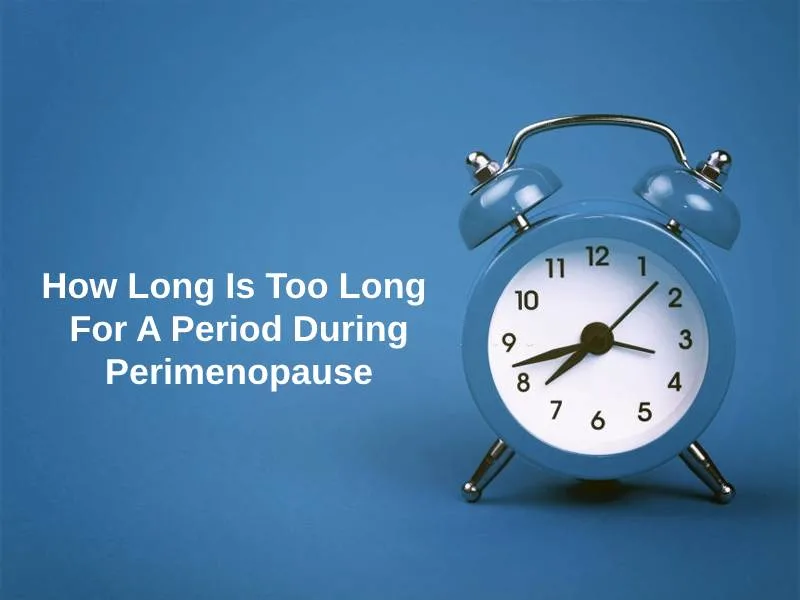Exact Answer: Up to 38 days
Perimenopause is an intermediate state of a woman’s reproductive life wherein she undergoes reproductive changes because of decreased hormone secretion. Women of mid or late 40s undergo perimenopause a year before menopause. During this state, the ovaries produce less estrogen and as a result, the body experiences several associated consequences such as changes in periods, mood, constant headache, etc.
The associated symptoms last for up to 4 years until the body undergoes menopause. The transition period lasts for at least 12 months as the body transitions from perimenopause to menopause. Perimenopause may disturb one’s regular period cycle and may make it longer or shorter based on hormonal changes.

How Long Is Too Long For A Period During Perimenopause?
The menstrual cycle begins to change during perimenopause. During this time, the body undergoes hormonal changes as estrogen and progesterone levels fluctuate. Perimenopause makes periods unpredictable and one may also experience spotting in between periods before the start of perimenopause.
Perimenopause causes changes in the intensity and duration of periods. One may experience longer periods with heavy blood flow, on the other hand, one may not have periods at all. Longer periods are described as periods with a duration of at least 38 days or more.
Long periods are also accompanied by heavy blood flow. They are caused due to the increase in the estrogen level and a decrease in the progesterone level which causes an irregularity in the consistent pattern of menstrual cycles. The hormonal change helps the uterine lining to grow and further leads to heavy bleeding.
Some of the other effects of perimenopause on the menstrual cycle include:
- Shorter periods
- Missed periods
- Closer periods
- Brown or dark blood
In addition to the changes in the menstrual cycle, various other symptoms accompany perimenopause. These symptoms last till a woman reaches menopause, however, in some cases the symptoms last for up to 12 years. Some of the common perimenopause associated symptoms include:
- Weight gain
- Muscle ache
- Headaches
- Breast tenderness
- Decreased sex drive
- Frequent mood changes
- Urinary tract infections
- Lack of concentration
- Forgetfulness
It is recommended to consult a doctor if one experiences periods for an abnormally long time frame as compared to the normal period cycle. Medical professionals may prescribe a series of treatments to tackle perimenopause-related pain and symptoms. Some of the treatments include hormone therapy, pain relievers, intrauterine device (IUD), regular exercise, etc.
In summary:
| Perimenopause Periods | Time |
| Longer | 38 days or more |
| Shorter | 0-3 days |
Why Do Long Periods During Perimenopause Last So Long?
A normal menstrual cycle occurs every 21 to 35 days. It lasts for anything between 2 to 7 days on average. Perimenopause causes insufficiency of hormones as the female body prepares to enter menopause within a year or more.
During the normal menstrual cycle, the body undergoes a consistent pattern of change in hormonal levels. Estrogen and progesterone levels increase and decrease according to the pattern. In perimenopause, the ovaries stop ovulating and as a result, the ovaries do not secrete enough amount of hormones leading to unpredictable bleeding.
Estrogen and progesterone are the most important hormones that regulate the menstrual cycle, therefore, even a slight change in its quantity can change period cycles. Long periods are unlong because of more estrogen levels in the body compared to progesterone. More estrogen levels also lead to the thickening of the uterine lining that further causes heavy bleeding.
It is recommended to consult a doctor immediately if one experiences a long period that is 38 days or more. If not taken care of, the condition may worsen along with the associated symptoms that can last for several years. Abnormal bleeding during perimenopause is common, however, it may also indicate:
- Endometrial atrophy
- Endometrial hyperplasia
- Polyps
- Fibroids
- Uterine cancer
Conclusion
Perimenopause is a reproductive transition state that leads towards menopause within 12 months. As the body prepares to reach menopause, the ovary stops ovulating regularly as a result of which the normal menstrual cycle gets disrupted leading to shorter or longer periods. Females experience other symptoms such as urinary tract infection, weight gain, headaches, etc in addition to menstrual cycle changes.
The long perimenopause period should not be longer than 38 days or more. It is recommended to seek medical help if one experiences periods for more than that to avoid any further health complications.